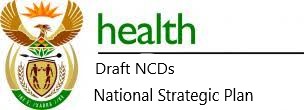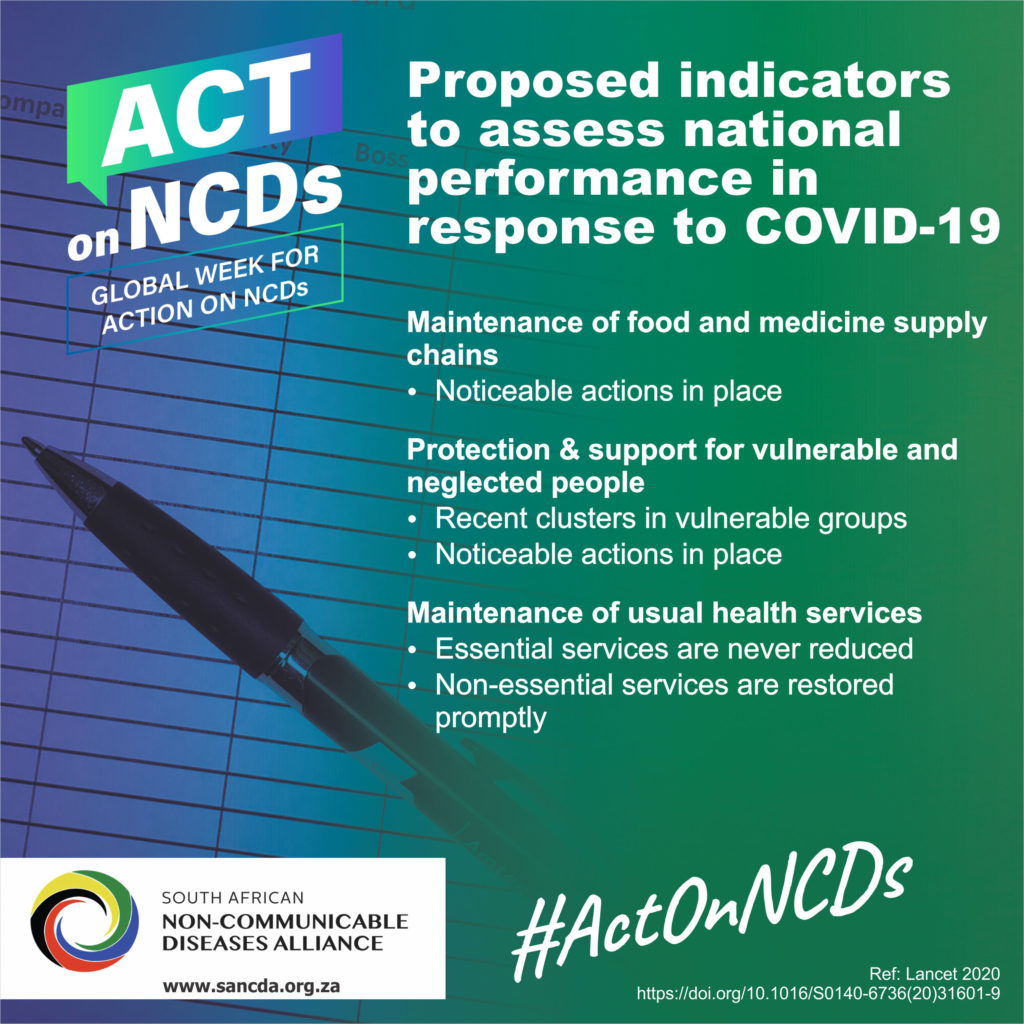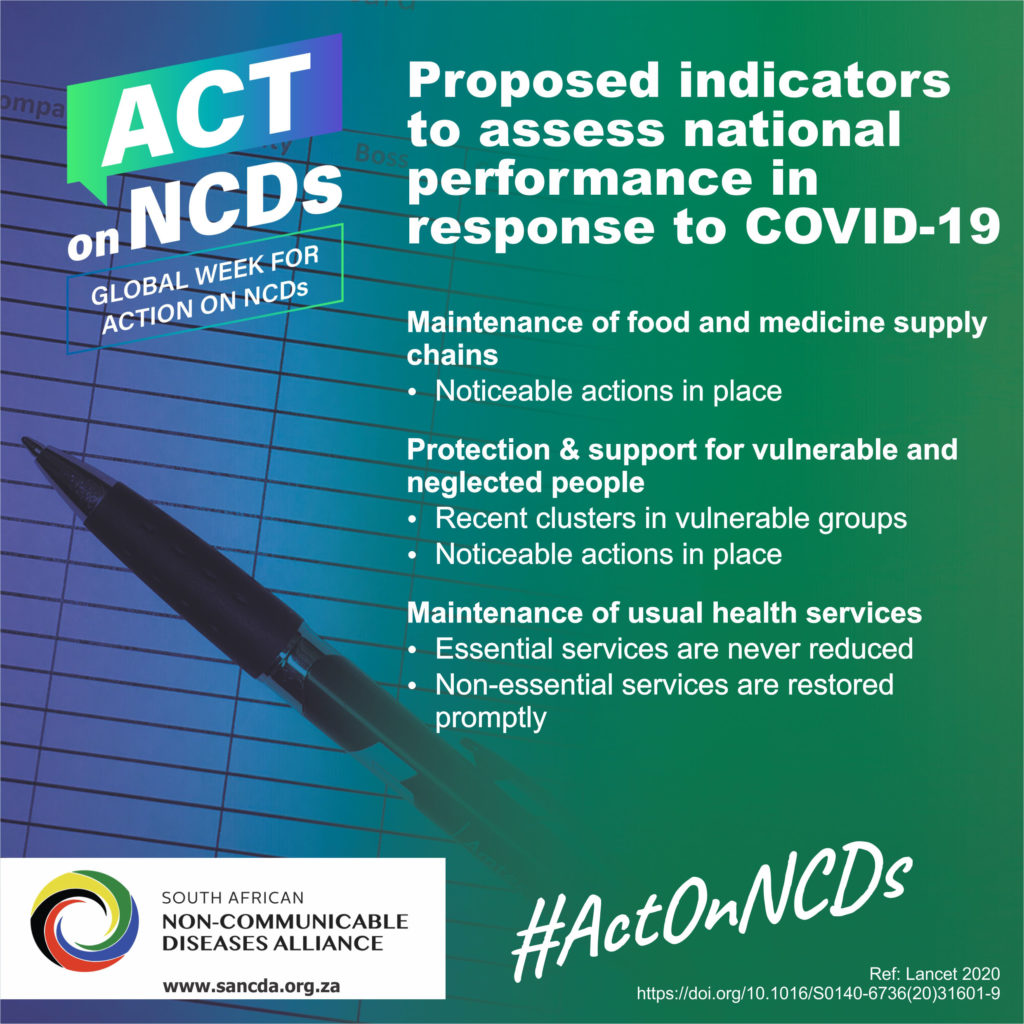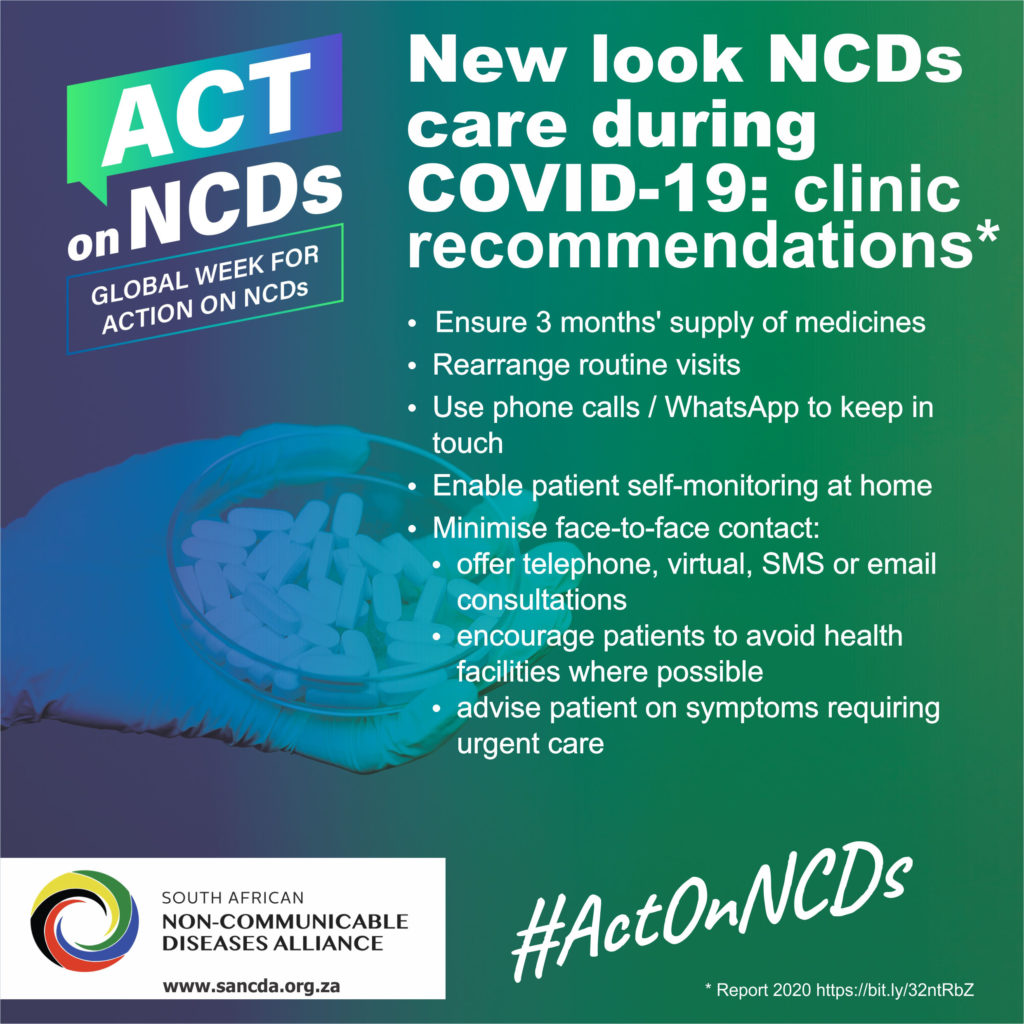
The SANCDA supports the prioritization of phase 2 vaccination. However, how this is to happen is less than transparent. PLWNCDs and related civil society organisations keep asking for transparent processes and policy for phase 2 vaccinations. South African policy must show the priority comorbid health conditions which place PLWNCDs at greatest risk for severe COVID-disease or death.
- Publish – COVID-19 deaths statistics by comorbidity/ underlying conditions.
- Compile – priority evidence-based list of comorbid conditions for phase 2 COVID vaccination.
- Communicate with public sector “health users” in phase 2 COVID-19 vaccination
1) Publish – COVID-19 deaths stats by comorbidity
The SANCDA want the ongoing publication on COVID-19 deaths according to the main underlying comorbidities. Civil society believes the release of this information is essential for transparency. The NDoH has this information for hospitalised patients. Sadly the format of publication doesnt show linked comorbidities.
However, before COVID-19 people who die outside of a hospital, the cause of death is notoriously poorly recorded. The challenge to the data collection is a long-standing issue. The most recent report from the 2016 cause of death statistics shows that 32.5% of reported deaths has this information missing. The top category of death is NCDs in 2016 but there has not been a publication on cause of death in SA since then.
This information is critical to ensure that the limited number of doses 12 million (6 million people we think) go those in greatest need according to facts.
The challenge is that outside of the NCDs sub directorate, the NDoH does not respond to our many requests for information. The NCDs civil society experience is that the long-held NDoH priority conditions of HIV, TB and malaria always remain just that. NCDs may get a mention and usually only diabetes and hypertension. So we want all of society to ask on behalf of the people living with NCDs.
2) Compile priority evidence-based list of comorbid conditions
So far in this pandemic we havent seen any transparent evidence based list of priority comorbid conditions. So how is this the priority to be determined? Compared with Millenium Development Goal (MDG) conditions like HIV/TB there are few NCDs indicators as shown in the National Indicator Data Set 2016.
South African health policy appears to be silent on how health priorities are determined. One of the few policies that address the needs of the population (priorities) is still in draft format and relatively recent, NHI Bill 2019.
PLWNCDs and their representative organisations wish to participate in and have a transparent evidence-based process to determine priority need and the criteria upon which this is based.
3) Communicate unambiguously with public sector users
The SANCDA asks for transparent clear communication on how people without health insurance/ medical aid will be selected and notified of vaccination date and time.
There are no adequate health systems information for people with NCDs. The current NHI health systems information is based on HIV and MDG information.
MDG conditions formed the basis for the development of health systems strengthening information system development and programmes such as the “Ideal Clinic.” integrated chronic disease management and CCMDD are all examples.
See the CCMDD access to medicines information and raise a storm.

With South Africa gearing to receive its first consignment of COVID-19 vaccines, President Cyril Ramaphosa has reiterated that government’s mass vaccination campaign strategy would reach all corners of the country, prioritising those most in need.
The President emphasised the commitment in the latest edition of his weekly newsletter on Monday 25 January
In coming weeks, the country will receive a batch of 1.5 million Astrazeneca vaccine doses from the Serum Institute of India, the world’s largest vaccine producer.
This, wrote the President, will signal the start of a mass vaccination campaign that will be the most ambitious and extensive in the country’s history.
“It will reach all parts of the country and will be phased to ensure that those most in need are prioritised. The first vaccines to arrive will be provided to health care workers, who will be targeted in the first phase.
“The second phase will include essential workers, teachers, the elderly and those with co-morbidities. The third phase will include other adults in the population,” President Ramaphosa said.
The comprehensive rollout strategy and an accompanying logistical framework will be implemented in partnership with the private sector, civil society, traditional leadership, the religious sector and others.
“It is vital that this is a society-wide campaign, in which everyone is involved and no-one is left behind,” he wrote.
“A year after the novel coronavirus started spreading around the world, the arrival of the vaccine gives great hope for our country’s social and economic recovery – and, most importantly, for the health of our people.”
The President said given the unprecedented global demand for vaccine doses, combined with the far greater buying power of wealthier countries, South Africa had to engage in extensive and protracted negotiations with manufacturers to secure enough vaccines to reach the country’s adult population.
“South Africa has engaged closely with the global COVAX facility and the African Union’s Vaccine Acquisition Task Team as part of the collective effort to secure vaccines for the world’s low- and middle-income countries. The doses that South Africa will receive through its participation in these initiatives, together with the agreements being made directly with manufacturers, are expected to ensure that the country has sufficient vaccines to contain the spread of the virus,” he said.
“From the moment the Coronavirus first reached our shores in March last year, we have acted swiftly and decisively, and informed by the best available scientific evidence, to save lives and protect livelihoods. Through the measures we have taken, we have been able to contain infections, protect our health system and prevent an even greater loss of life,” said the President.
He said: “Understanding that vaccines are essential if we are to overcome the pandemic, government has been working, both through multilateral initiatives and direct negotiations with manufacturers, to ensure South Africa can make the best use of vaccines when they become available”.
Regarding concern that government has not been sufficiently transparent about these efforts, President Ramaphosa said as government did with the announcement on the Serum Institute, the details of deals with manufacturers will be released as and when negotiations are concluded and we are released from the communications terms of the non-disclosure agreements.
“This is commonplace in such circumstances, and most governments have had to comply with similar restrictions,” he said.
“We recognise that it is important that the public must be kept abreast of developments on vaccine acquisition at all times. And government must be held to account for all the decisions it makes in this regard.”
Throughout the pandemic, he said, government has been open and transparent with the South African people on the health measures it is taking to secure the safety of people.
“We have sought to explain all our decisions, to listen to people’s concerns and to continuously update the country on the state of the disease,” he said.
He added: “All of us need to be part of this national effort and not allow the spread of rumours, fear and mistrust. False information and fake news can and does put lives at risk. We all need to work together to build confidence in the vaccine, to demonstrate its effectiveness and its safety – and to emphasise its vital importance in overcoming this deadly disease”.
For its part, he wrote, government will work to improve all its channels of communication, to keep the public regularly informed on the development of the vaccination programme, to provide information that is accurate and factual, and to continue to engage with and listen to the broad range of voices in society.
“We have a massive task ahead of us, probably far greater than any of us has ever undertaken before. But if we work together, if we support and trust each other and if we keep the lines of communication open, we will certainly succeed,” said the President.

With South Africa gearing to receive its first consignment of COVID-19 vaccines, President Cyril Ramaphosa has reiterated that government’s mass vaccination campaign strategy would reach all corners of the country, prioritising those most in need.
The President emphasised the commitment in the latest edition of his weekly newsletter on Monday 25 January
In coming weeks, the country will receive a batch of 1.5 million Astrazeneca vaccine doses from the Serum Institute of India, the world’s largest vaccine producer.
This, wrote the President, will signal the start of a mass vaccination campaign that will be the most ambitious and extensive in the country’s history.
“It will reach all parts of the country and will be phased to ensure that those most in need are prioritised. The first vaccines to arrive will be provided to health care workers, who will be targeted in the first phase.
“The second phase will include essential workers, teachers, the elderly and those with co-morbidities. The third phase will include other adults in the population,” President Ramaphosa said.
The comprehensive rollout strategy and an accompanying logistical framework will be implemented in partnership with the private sector, civil society, traditional leadership, the religious sector and others.
“It is vital that this is a society-wide campaign, in which everyone is involved and no-one is left behind,” he wrote.
“A year after the novel coronavirus started spreading around the world, the arrival of the vaccine gives great hope for our country’s social and economic recovery – and, most importantly, for the health of our people.”
The President said given the unprecedented global demand for vaccine doses, combined with the far greater buying power of wealthier countries, South Africa had to engage in extensive and protracted negotiations with manufacturers to secure enough vaccines to reach the country’s adult population.
“South Africa has engaged closely with the global COVAX facility and the African Union’s Vaccine Acquisition Task Team as part of the collective effort to secure vaccines for the world’s low- and middle-income countries. The doses that South Africa will receive through its participation in these initiatives, together with the agreements being made directly with manufacturers, are expected to ensure that the country has sufficient vaccines to contain the spread of the virus,” he said.
“From the moment the Coronavirus first reached our shores in March last year, we have acted swiftly and decisively, and informed by the best available scientific evidence, to save lives and protect livelihoods. Through the measures we have taken, we have been able to contain infections, protect our health system and prevent an even greater loss of life,” said the President.
He said: “Understanding that vaccines are essential if we are to overcome the pandemic, government has been working, both through multilateral initiatives and direct negotiations with manufacturers, to ensure South Africa can make the best use of vaccines when they become available”.
Regarding concern that government has not been sufficiently transparent about these efforts, President Ramaphosa said as government did with the announcement on the Serum Institute, the details of deals with manufacturers will be released as and when negotiations are concluded and we are released from the communications terms of the non-disclosure agreements.
“This is commonplace in such circumstances, and most governments have had to comply with similar restrictions,” he said.
“We recognise that it is important that the public must be kept abreast of developments on vaccine acquisition at all times. And government must be held to account for all the decisions it makes in this regard.”
Throughout the pandemic, he said, government has been open and transparent with the South African people on the health measures it is taking to secure the safety of people.
“We have sought to explain all our decisions, to listen to people’s concerns and to continuously update the country on the state of the disease,” he said.
He added: “All of us need to be part of this national effort and not allow the spread of rumours, fear and mistrust. False information and fake news can and does put lives at risk. We all need to work together to build confidence in the vaccine, to demonstrate its effectiveness and its safety – and to emphasise its vital importance in overcoming this deadly disease”.
For its part, he wrote, government will work to improve all its channels of communication, to keep the public regularly informed on the development of the vaccination programme, to provide information that is accurate and factual, and to continue to engage with and listen to the broad range of voices in society.
“We have a massive task ahead of us, probably far greater than any of us has ever undertaken before. But if we work together, if we support and trust each other and if we keep the lines of communication open, we will certainly succeed,” said the President.





